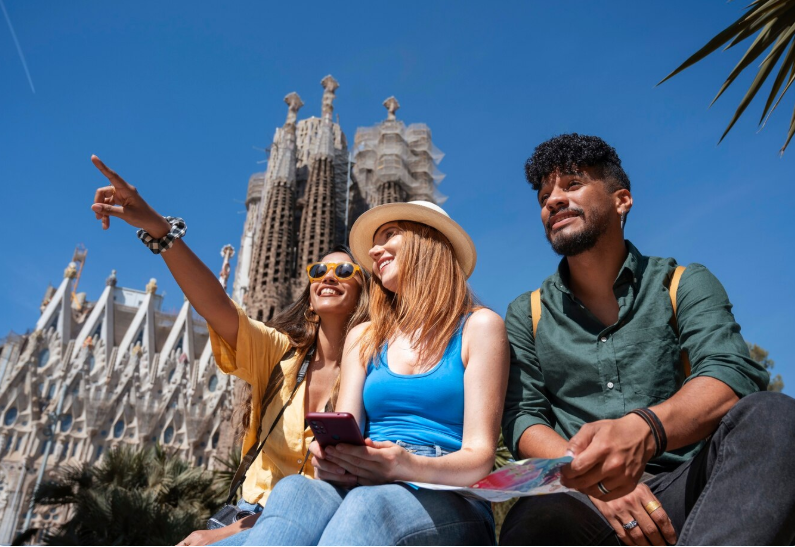
by Dulce Navarro | Jun 16, 2025 | Countries, Culture, Europe, Lifestyle, Travel
Luxury Travel in Europe: Experiences Worth Every Euro
Europe has long been synonymous with elegance, refinement, and timeless beauty. For discerning travelers seeking the ultimate indulgence, the continent offers a treasure trove of luxury experiences that go far beyond five-star hotels and first-class flights. From private château stays to Michelin-starred dining in the Alps, luxury in Europe is about immersive, one-of-a-kind experiences that elevate travel to an art form.
1. Exclusive Stays: Sleeping in Style
Europe is home to some of the world’s most iconic luxury accommodations. In France, the Château de la Messardière in Saint-Tropez offers panoramic views of the Mediterranean and a level of privacy that attracts A-list clientele. Over in Italy, Lake Como’s Villa d’Este delivers old-world opulence with lakeside tranquility, making it a favorite among royalty and celebrities alike.
For a unique twist, consider booking a private island in Greece, such as Skorpios, once owned by the Onassis family. Today, ultra-luxury rentals here come with butlers, chefs, and a curated itinerary that’s entirely your own.
2. Private Yachting Across the Mediterranean
Chartering a private yacht is perhaps the pinnacle of luxury European travel. From the Amalfi Coast to the Balearic Islands, sailing offers both privacy and prestige. Crewed yachts come with gourmet chefs, sommeliers, and a full staff trained to deliver top-tier hospitality.
Popular routes include cruising from Monaco to Portofino or island-hopping through Croatia’s Dalmatian coast. With custom itineraries and every need catered to, yachting blends exploration with absolute comfort.
3. Culinary Excellence: Europe’s Gastronomic Temples
Food is an essential part of the luxury travel experience, and Europe’s culinary scene is second to none. France boasts over 600 Michelin-starred restaurants, including legendary spots like Le Meurice Alain Ducasse in Paris and Maison Pic in Valence.
In Spain, indulge in avant-garde cuisine at Disfrutar in Barcelona or traditional tapas with a modern twist in San Sebastián. Italy tempts with truffle-hunting tours in Piedmont followed by multi-course meals in hillside villas. Every meal becomes a memory, crafted with precision and passion.
4. Private Tours of Cultural Icons
Skip the crowds and explore Europe’s masterpieces on your own terms. Private, after-hours tours can be arranged at institutions like the Vatican Museums, where you can stand alone in the Sistine Chapel, or the Louvre, where art historians guide you through works most only see in textbooks.
Beyond museums, consider exclusive experiences like a behind-the-scenes look at Vienna’s Spanish Riding School or an invitation-only tour of Champagne houses in Épernay, complete with vintage tastings.
5. First-Class Train Journeys
Rail travel in Europe doesn’t have to be pedestrian. The Venice Simplon-Orient-Express is the epitome of nostalgic luxury, offering a journey back in time with its Art Deco carriages and black-tie dinners. Routes include Paris to Istanbul and Venice to Amsterdam, where travelers enjoy gourmet meals, live piano music, and curated shore excursions.
For scenic indulgence, the Glacier Express in Switzerland provides panoramic views of the Alps in plush comfort. This is slow travel at its most refined.
6. Wellness and Rejuvenation in Elite Retreats
For those seeking tranquility and renewal, Europe offers high-end wellness retreats that fuse natural beauty with cutting-edge treatments. The Lanserhof Tegernsee in Germany is a medical wellness resort blending detox therapies with alpine serenity. Meanwhile, Portugal’s Six Senses Douro Valley provides yoga, organic cuisine, and personalized spa experiences in a centuries-old wine estate.
These sanctuaries are ideal for disconnecting, recharging, and realigning with personal well-being.
7. Haute Couture Shopping Experiences
Shopping in Europe becomes an experience of luxury when paired with exclusivity. In Paris, private shopping appointments at maisons like Chanel or Dior include champagne receptions and access to unreleased collections. Milan offers personal stylists and atelier tours, while London’s Bond Street features luxury concierge services at every flagship store.
These curated shopping experiences transform fashion into a cultural and artistic journey.
8. Immersive Cultural Moments
Luxury also lies in authenticity. Attend a private concert at a Viennese palace, join a curated wine harvest in Bordeaux, or dine inside a historic Scottish castle. Europe’s charm lies in its layered history and living traditions—luxury travel makes them accessible in intimate and unforgettable ways.
Learning New Languages as an Expat: Strategies for Quick Success
Luxury travel often evolves into extended stays, and with that comes the opportunity to embrace local culture through language. Here are key strategies for mastering a new language as an expat:
- Daily Immersion: Surround yourself with local media—TV, newspapers, and podcasts—in the target language.
- Professional Tutoring: Hire native-speaking tutors for structured, accelerated learning.
- Language Exchange: Pair up with locals who want to improve their English while helping you learn their language.
- Speak Often: Use the language in daily situations—even simple greetings and market conversations build fluency.
- Stay Consistent: Consistency is key. Dedicate 15–30 minutes per day to active study and application.
Fluency opens doors to deeper connections, authentic experiences, and even new business opportunities. It’s one of the most valuable investments you can make as an international professional.
Stay Connected for More Travel and Lifestyle Inspiration
For more insights into travel, culture, and lifestyle tips, follow me on @salvadorordorica. If you’re seeking professional translation and localization services to enhance your global ventures, visit The Spanish Group — your trusted partner in bridging cultures worldwide.

by Dulce Navarro | Jun 16, 2025 | Countries, Europe, Residency, Travel
Digital Nomad Visas in France: Requirements and Perks
As remote work becomes the new normal, more professionals are taking advantage of the freedom to work from anywhere. France, with its picturesque landscapes, rich culture, and high standard of living, has emerged as an attractive destination for digital nomads. Whether you’re a freelancer, entrepreneur, or remote employee, the country now offers pathways to legally live and work while enjoying everything from the Alps to the Côte d’Azur.
Understanding the Digital Nomad Visa
While France doesn’t yet have a visa officially named “Digital Nomad Visa,” it provides viable alternatives for remote workers under existing visa categories. The most commonly used pathways include:
- Long-Stay Visitor Visa (Visa de Long Séjour): Ideal for remote workers who want to stay in France for more than 90 days without seeking employment locally.
- Profession Libérale Visa: Tailored for freelancers or self-employed professionals looking to set up a business in France.
- Talent Passport – Entrepreneur: For individuals who plan to invest in a French company or launch an innovative project.
Each of these options requires careful planning and documentation, but they serve the growing number of digital professionals interested in working while immersed in the French lifestyle.
Visa Requirements
While requirements can vary depending on the visa type, the following are common prerequisites for digital nomads:
- Proof of Income: Applicants must demonstrate sufficient financial means to support themselves without relying on French social systems. A monthly income of at least €1,500–€2,000 is generally expected.
- Health Insurance: Comprehensive international or French private health coverage is mandatory for the entire duration of stay.
- Proof of Accommodation: Whether renting or staying with friends/family, documentation of your French address is required.
- Criminal Background Check: A clean record is essential for visa approval.
- Professional Evidence: Freelancers or business owners should provide contracts, client letters, or proof of ongoing projects.
Applications typically begin at the nearest French consulate in your home country. Once approved, you receive a long-stay visa that can be converted into a residence permit upon arrival in France.
Top Benefits of Being a Digital Nomad in France
Choosing France as your remote work base comes with numerous advantages beyond the romanticized appeal of Parisian cafes or countryside charm.
1. Quality of Life
France consistently ranks among the top countries in Europe for quality of life. With efficient public transport, excellent healthcare, and a strong social fabric, it’s a country designed for both comfort and culture.
2. Strategic Location
Located at the heart of Europe, France offers easy access to major cities like London, Berlin, Rome, and Barcelona, making it an ideal base for business travel or weekend exploration.
3. Strong Infrastructure
With high-speed internet, coworking spaces, and well-developed amenities even in smaller towns, France caters well to digital professionals.
4. Cultural and Culinary Wealth
Living in France means immersing yourself in a rich tapestry of art, history, and world-class cuisine. This cultural stimulation can boost creativity and work-life satisfaction.
5. Favorable Tax Structures (in Some Cases)
Certain visa categories allow for tax advantages or exemptions, especially under bilateral agreements or startup incentives. It’s wise to consult a tax advisor specializing in expat law for personalized guidance.
Challenges to Consider
While the perks are plentiful, there are practical hurdles to overcome:
- Bureaucracy: French administrative processes can be slow and paperwork-intensive.
- Language Barrier: While many locals speak English in urban areas, navigating official procedures often requires French fluency.
- Cost of Living: Cities like Paris can be expensive. However, smaller towns offer more affordable options without compromising on charm.
Learning New Languages as an Expat: Strategies for Quick Success
Mastering French can dramatically improve your daily experience, help you integrate into the community, and unlock more professional opportunities. Here are a few strategies for learning quickly:
- Daily Immersion: Surround yourself with the language by switching your devices to French, reading local newspapers, and watching French TV shows or YouTube channels.
- Language Exchange Partners: Meet locals who want to practice English in exchange for helping you with French. Apps like Tandem or local Facebook groups are great resources.
- Enroll in Language Schools: Institutions like Alliance Française offer structured classes with certified instructors and cultural orientation.
- Practice Speaking Daily: Even if it’s just ordering a croissant or asking for directions, practice builds confidence and fluency.
- Use Language Apps: Tools like Duolingo, Babbel, and Pimsleur can accelerate your learning in just 15 minutes a day.
Learning the language not only empowers your independence but also deepens your appreciation for French culture. Over time, what once seemed intimidating becomes an asset in your personal and professional journey abroad.
Stay Connected for More Travel and Lifestyle Inspiration
For more insights into travel, culture, and lifestyle tips, follow me on @salvadorordorica. If you’re seeking professional translation and localization services to enhance your global ventures, visit The Spanish Group — your trusted partner in bridging cultures worldwide.

by Dulce Navarro | Jun 11, 2025 | Countries, Culture, Europe, Lifestyle, Travel
Off the Beaten Path: Unexplored European Destinations
When most travelers envision a European getaway, cities like Paris, Rome, or Barcelona likely come to mind. However, Europe is brimming with hidden gems that offer rich culture, breathtaking landscapes, and a more intimate travel experience. For business travelers, expatriates, and culture enthusiasts seeking destinations beyond the usual tourist trail, this curated list introduces lesser-known European spots that are as enchanting as they are underrated.
1. Albarracín, Spain
Nestled in the mountains of Aragon, Albarracín is a medieval village frozen in time. Winding cobblestone streets, terracotta-roofed houses, and ancient city walls transport visitors back centuries. The town’s unique pink-hued stone architecture and serene atmosphere make it ideal for a quiet cultural retreat or a weekend escape from Madrid or Valencia. With its rich Moorish history and artisanal crafts, Albarracín offers an authentic slice of Spain rarely touched by mass tourism.
2. Vipava Valley, Slovenia
Often overshadowed by the more famous Lake Bled and Ljubljana, the Vipava Valley is a haven for wine lovers and adventure seekers. This picturesque region, known for its boutique wineries and farm-to-table cuisine, sits at the crossroads of the Mediterranean and Alpine climates. Visitors can explore hiking trails, paragliding routes, and charming towns like Ajdovščina, all while enjoying local wines like Zelen and Pinela. The valley’s tranquil vibe makes it an ideal off-the-grid destination for rest and inspiration.
3. Ronda, Spain
Located in Andalusia, Ronda captivates travelers with its dramatic cliffside views and the deep El Tajo gorge that splits the town in two. While gaining popularity in recent years, Ronda still remains far less visited than nearby Seville or Granada. Its Puente Nuevo bridge and ancient bullring provide historical insight, while its surrounding vineyards and natural parks offer escape into nature. It’s a perfect destination for those seeking history, scenery, and Spanish authenticity in one location.
4. Sibiu, Romania
One of Romania’s best-kept secrets, Sibiu blends Gothic, Baroque, and Renaissance architecture with a surprisingly modern cultural scene. Once a European Capital of Culture, the city boasts theaters, museums, and festivals year-round. Its Old Town is pristine and welcoming, and the Transylvanian countryside that surrounds it is filled with fortified churches and picturesque hills. Ideal for travelers seeking affordability and authenticity, Sibiu is a reminder of Europe’s diverse historical fabric.
5. Isle of Eigg, Scotland
Off the west coast of Scotland lies the tiny, self-sufficient Isle of Eigg. Part of the Inner Hebrides, Eigg is entirely community-owned and runs on renewable energy. The island is perfect for nature lovers, offering dramatic cliffs, pristine beaches, and an abundance of wildlife. With fewer than 100 residents, Eigg’s quiet charm lies in its remoteness. It’s a place to disconnect, hike, birdwatch, and experience a close-knit, eco-conscious European community.
6. Monemvasia, Greece
Unlike the crowded islands of Santorini or Mykonos, Monemvasia is a medieval fortress town carved into the side of a massive rock off the Peloponnesian coast. Often called the “Gibraltar of the East,” this destination offers stunning sea views, Byzantine churches, and quiet stone alleyways. It’s a haven for romance, history, and traditional Greek hospitality. The entire island feels like a living museum—ideal for those looking to immerse themselves in both history and seclusion.
7. Kuldīga, Latvia
This quaint Latvian town is home to Europe’s widest waterfall—Ventas Rumba—and a charming collection of 17th- and 18th-century wooden buildings. Kuldīga feels like stepping into a storybook. Known for its peaceful riverbanks and slow pace of life, it’s a wonderful spot to unwind while learning about Latvian culture and traditions. It also makes a great base for exploring Latvia’s many natural parks and coastline.
8. Conclusion: Learning New Languages as an Expat – Strategies for Quick Success
As you explore offbeat destinations or relocate as an expat, language is your bridge to deeper cultural understanding. To succeed quickly in a new linguistic environment:
- Immerse yourself daily: Change your phone, social media, or music settings to the target language.
- Use language apps: Duolingo, Babbel, and Memrise are great for on-the-go practice.
- Take local classes: Community centers and language schools offer immersive environments and social opportunities.
- Practice with locals: Speak as often as possible, even if imperfectly. Most people appreciate the effort.
- Keep a journal: Write a few sentences daily about your experiences in the new language.
Mastering a language opens doors to understanding local customs, building relationships, and thriving in foreign environments. Whether you’re traveling or settling down, language fluency is one of the most empowering tools you can have.
Stay Connected for More Travel and Lifestyle Inspiration
For more insights into travel, culture, and lifestyle tips, follow me on @salvadorordorica. If you’re seeking professional translation and localization services to enhance your global ventures, visit The Spanish Group — your trusted partner in bridging cultures worldwide.

by Dulce Navarro | Jun 11, 2025 | Countries, Culture, Europe, Traditions, Travel
Inclusive Communities Through Language and Culture
In today’s globalized society, the concept of community has transcended borders and linguistic boundaries. More than ever, people from diverse cultural and linguistic backgrounds are coming together to live, work, and thrive. At the heart of truly inclusive communities lies a powerful tool: language. Language not only enables communication—it fosters connection, understanding, and a shared sense of identity.
The Role of Language in Building Inclusive Societies
Language serves as both a bridge and a gateway. It bridges gaps between cultures and serves as a gateway to meaningful interactions. When people are empowered to communicate in a common language—or when their native language is acknowledged and respected—they are more likely to participate fully in the social, economic, and civic life of a community.
In multilingual cities around the world, public services, schools, and businesses that embrace linguistic diversity often see higher engagement and satisfaction among residents. Translation and interpretation services, multilingual signage, and inclusive language policies make people feel seen and valued, no matter where they come from.
Culture: The Companion to Language
While language gives us the words, culture gives them context. Understanding cultural norms, values, and traditions enhances communication and reduces misunderstandings. Cultural literacy—just like linguistic fluency—is essential for meaningful integration. From food and festivals to family structures and etiquette, culture shapes how people perceive and engage with the world around them.
Inclusive communities don’t just tolerate cultural differences—they celebrate them. Cultural exchange programs, international fairs, local arts initiatives, and storytelling events all play a critical role in fostering empathy and mutual respect. By valuing the rich backgrounds of all community members, societies can create a sense of belonging that transcends origin.
Business and Policy Implications
For business leaders and policymakers, investing in language and cultural inclusion is not just a moral imperative—it’s a smart strategy. Companies that offer multilingual support attract a broader customer base, gain a competitive edge in international markets, and cultivate stronger brand loyalty. Internally, diverse teams that understand one another’s perspectives are more innovative and collaborative.
On a governmental level, inclusive language policies improve access to education, healthcare, and public services. Municipalities that provide interpretation assistance and culturally appropriate outreach programs see increased participation in community events, improved public health outcomes, and greater civic trust.
The Expat Experience: Language as a Tool for Integration
For expatriates, language is often the first—and most daunting—barrier to feeling at home in a new country. Mastering a new language is not only key to navigating everyday life, but also essential for developing relationships, finding employment, and participating in the local culture. Expats who embrace language learning typically report higher levels of happiness and integration.
However, language learning doesn’t happen in isolation. Successful integration also depends on open, welcoming communities that create space for cultural exchange and mutual learning. When both expats and locals approach one another with curiosity and respect, they lay the groundwork for vibrant, inclusive societies.
Case Studies: Communities Leading the Way
Around the world, numerous cities have become beacons of inclusivity through innovative language and cultural initiatives:
- Toronto, Canada: Known for its multicultural neighborhoods, Toronto provides translation services in over 140 languages across public health and municipal departments.
- Barcelona, Spain: The city’s “Welcome Plan” includes free Catalan and Spanish classes for newcomers, as well as cultural mediation programs to support immigrant families.
- Melbourne, Australia: With a high percentage of foreign-born residents, Melbourne promotes intercultural understanding through local libraries offering multilingual materials and conversation circles.
These examples highlight how forward-thinking policies and community engagement can turn diversity into a powerful asset.
Learning New Languages as an Expat: Strategies for Quick Success
If you’re an expat looking to integrate quickly into your new environment, here are a few proven strategies to accelerate your language learning journey:
- Immerse Yourself: Surround yourself with the language as much as possible—watch local TV, read the news, and listen to music in your target language.
- Practice Daily: Consistency is key. Even 15 minutes a day of structured learning can make a big difference over time.
- Join Local Groups: Language exchanges, hobby clubs, and volunteer opportunities are great ways to practice conversational skills and build community.
- Use Technology: Apps like Duolingo, Babbel, or Tandem offer accessible ways to practice on the go.
- Be Patient and Persistent: Mistakes are part of the process. Keep showing up and celebrating small wins.
Learning a new language is one of the most rewarding investments you can make as an expat. It opens doors not only to better communication but to deeper cultural connection and long-term personal growth.
Stay Connected for More Travel and Lifestyle Inspiration
For more insights into travel, culture, and lifestyle tips, follow me on @salvadorordorica. If you’re seeking professional translation and localization services to enhance your global ventures, visit The Spanish Group — your trusted partner in bridging cultures worldwide.

by Dulce Navarro | Jun 10, 2025 | Countries, Culture, Europe, Lifestyle, Travel
Discover the French Riviera: A Luxury Travel Guide
The French Riviera, or Côte d’Azur, has long captivated the world’s elite with its breathtaking coastline, vibrant cultural scene, and timeless glamour. From world-class cuisine to iconic film festivals, this Mediterranean paradise offers a rich tapestry of experiences suited to the most discerning traveler. Whether you’re considering a summer escape or a long-term relocation, the Riviera promises luxury, comfort, and culture in equal measure.
Where to Stay: Iconic Hotels and Private Villas
The French Riviera is synonymous with opulence, and accommodations here reflect that reputation. In Monte Carlo, the Hotel de Paris Monte-Carlo offers regal suites, a private beach club, and immediate access to the famed Casino de Monte-Carlo. In Cannes, Hotel Barrière Le Majestic stands steps away from La Croisette and the Palais des Festivals, perfect for film lovers.
For those desiring a more intimate and personalized experience, renting a private villa in Saint-Jean-Cap-Ferrat or Èze provides unparalleled privacy with sweeping sea views. Many come with full staff, infinity pools, and curated concierge services to ensure a seamless stay.
Best Experiences: Culture, Cuisine, and Coastline
Explore Iconic Destinations
Nice, with its Promenade des Anglais and pastel-colored Old Town, offers a blend of urban charm and beachside relaxation. Stroll through the flower market in Cours Saleya or visit the Matisse Museum for a dose of culture.
Head to Antibes to discover the Picasso Museum and soak up the old-world charm of the port. Don’t miss a visit to Villa Ephrussi de Rothschild in Saint-Jean-Cap-Ferrat, a pink-palace oasis surrounded by themed gardens and art collections.
Indulge in Gourmet Dining
From Michelin-starred establishments to charming seaside cafés, the French Riviera boasts an enviable culinary scene. Try Le Louis XV – Alain Ducasse in Monaco for an unforgettable gastronomic experience. In Menton, Mirazur (named the World’s Best Restaurant in 2019) serves a unique, seasonally driven tasting menu.
For something more relaxed, enjoy a long lunch at La Guérite on Île Sainte-Marguerite—arrive by boat and dine to the sound of waves and live music.
Yachting and Coastal Excursions
Chartering a yacht along the coast is a quintessential Riviera experience. Spend the day exploring hidden coves, snorkeling in turquoise waters, and enjoying onboard champagne lunches. From Cannes to Saint-Tropez, private charters offer customizable itineraries and luxury amenities.
If you prefer land-based adventure, drive the Corniche roads between Nice and Monaco. These cliff-hugging routes offer panoramic views of the Mediterranean and are perfect for a scenic day trip.
Exclusive Events and Seasonal Highlights
The French Riviera hosts some of the most prestigious events in the world. The Cannes Film Festival in May brings global cinema to the forefront, accompanied by glamorous red-carpet moments. Monaco Grand Prix, held in late May, combines Formula 1 adrenaline with A-list opulence.
During the summer, Jazz à Juan in Antibes and Nice Jazz Festival draw music lovers to the coast. The festive season, though quieter, still offers lights, markets, and fine dining experiences with fewer crowds.
Shopping and Style
Shopping on the Riviera is as stylish as it is varied. Monaco’s Metropole Shopping Monte-Carlo houses designer boutiques including Chanel, Hermès, and Celine. In Saint-Tropez, explore the chic shops of Place des Lices or discover unique pieces from local artisans in the village streets.
Nice’s pedestrian shopping zones and weekly antique markets also offer great finds for fashionistas and collectors alike.
Living as an Expat on the Riviera
For those considering a move to the French Riviera, the quality of life is unmatched. With a Mediterranean climate, excellent healthcare, and a multilingual international community, the region supports a smooth transition into expat life. Cities like Nice and Antibes are particularly expat-friendly, offering a mix of French culture and international amenities.
Networking groups, bilingual schools, and local clubs make it easy to connect and integrate. The French Riviera also serves as a convenient base for travel across Europe, with excellent transportation links and proximity to major cities like Milan, Barcelona, and Geneva.
Learning New Languages as an Expat: Strategies for Quick Success
Adjusting to life abroad is much smoother when you embrace the local language. Here are a few effective strategies for learning French (or any new language) quickly and confidently:
- Enroll in immersive language courses – Many cities offer intensive programs for adults.
- Use language apps like Duolingo, Babbel, or Memrise to reinforce vocabulary daily.
- Practice with locals – Join conversation groups, attend local events, and don’t be afraid to make mistakes.
- Label your environment – Put sticky notes on household items to reinforce vocabulary at home.
- Set realistic goals – Aim for conversational fluency first, and build from there.
Whether you’re relocating for lifestyle, work, or simply the adventure, mastering the local language deepens your connection to the culture and community around you.
Stay Connected for More Travel and Lifestyle Inspiration. For more insights into travel, culture, and lifestyle tips, follow me on
@salvadorordorica. If you’re seeking professional translation and localization services to enhance your global ventures, visit
The Spanish Group — your trusted partner in bridging cultures worldwide.

by Dulce Navarro | Jun 9, 2025 | Countries, Culture, Europe, Lifestyle, Travel
Best Cities for Expats in Spain: Where to Work and Live
Spain continues to be one of the most attractive destinations for expatriates worldwide, thanks to its rich culture, welcoming climate, and high quality of life. Whether you’re looking to relocate for professional opportunities, a slower pace of life, or a bit of both, Spain offers diverse cities that cater to a wide range of lifestyles and work environments. Below, we explore the best cities in Spain for expats — based on employment prospects, cultural integration, and lifestyle perks.
1. Barcelona – Innovation Meets Mediterranean Charm
Barcelona is not only a tourist favorite but also a top choice for international professionals. As the capital of Catalonia, the city is a vibrant blend of modern innovation and rich historical tradition. It’s home to numerous multinational companies, a growing tech startup scene, and frequent networking events that make it easy to integrate into the local professional community.
With its Mediterranean coastline, Gaudí’s architectural marvels, and a plethora of cafes and co-working spaces, Barcelona is ideal for both work and leisure. Keep in mind that while Spanish and Catalan are spoken here, many international companies operate in English, making the transition easier for non-Spanish speakers.
2. Madrid – Spain’s Cosmopolitan Capital
Madrid is the political, financial, and cultural heart of Spain. For expats working in finance, law, education, or government-related sectors, Madrid offers the most opportunities. It is home to many international corporations, major universities, and research institutions, providing a thriving environment for professionals and academics alike.
Beyond work, Madrid boasts world-class museums like the Prado, vibrant nightlife, and a diverse culinary scene. Its central location also makes it ideal for weekend trips to other parts of Spain. Though the cost of living is slightly higher, the job prospects and urban lifestyle more than compensate for it.
3. Valencia – The Ideal Work-Life Balance
Valencia strikes a perfect balance between big-city amenities and a relaxed coastal vibe. It’s particularly attractive for digital nomads and remote workers, with a growing number of coworking spaces and tech events. The cost of living here is lower than in Madrid or Barcelona, making it appealing for young professionals and families alike.
Known for its City of Arts and Sciences, delicious paella, and wide beaches, Valencia offers a high quality of life with less of the hustle and bustle. It also has a reliable public transport system and is generally regarded as one of the safest cities in Spain.
4. Málaga – A Rising Star for Expats and Entrepreneurs
Once seen purely as a tourist gateway to the Costa del Sol, Málaga has recently reinvented itself as a modern and forward-thinking city. The tech industry is booming here, with Google establishing a cybersecurity center and other tech hubs on the rise.
Málaga also features a lower cost of living than other major cities, stunning beaches, a growing art scene, and great weather year-round. For entrepreneurs and creatives looking to base themselves in a coastal city with rising international influence, Málaga is worth serious consideration.
5. Seville – For Cultural Immersion and a Slower Pace
If you’re looking to experience traditional Andalusian culture while enjoying a relaxed lifestyle, Seville may be the place for you. While the job market may not be as broad as Madrid or Barcelona, there are still opportunities in education, tourism, and small business sectors.
Known for its flamenco music, Moorish architecture, and festivals like Semana Santa, Seville offers a deep sense of community and rich cultural immersion. It’s perfect for expats who value lifestyle and cultural connection over high-powered careers.
6. Bilbao – The Industrial Powerhouse with Cultural Flair
Located in the Basque Country, Bilbao offers a unique experience compared to the rest of Spain. It’s an economic hub with a strong industrial and services sector, making it ideal for engineers, architects, and logistics professionals. The presence of international companies and a world-renowned design scene (including the iconic Guggenheim Museum) makes it an exciting city for creatives and professionals alike.
Bilbao also offers a slightly cooler climate and a more reserved cultural style, which can be ideal for expats looking for a different pace and atmosphere.
7. Granada – Affordable Living with Scenic Beauty
Granada is a hidden gem for expats, especially those seeking an affordable, picturesque place to live. The cost of living is one of the lowest among Spanish cities, and the views of the Sierra Nevada mountains, along with the historic Alhambra, make it a magical place to call home.
It’s a university town, so there’s a youthful and international population. While job opportunities may be more limited, it’s a great spot for remote workers or retirees looking for charm and serenity.
Learning New Languages as an Expat: Strategies for Quick Success
As an expat in Spain, learning Spanish — or even a regional language like Catalan or Basque — can dramatically improve your quality of life and work experience. Here are a few strategies to accelerate your language learning journey:
- Immerse Yourself Daily: Listen to Spanish podcasts, watch local TV, and change your phone’s language settings to Spanish.
- Join a Language Exchange: Many cities host “intercambios” where locals and expats meet to practice languages over coffee or drinks.
- Take Formal Classes: Consider enrolling in a language school, especially in the early months.
- Use Apps: Duolingo, Babbel, and Rosetta Stone are great tools for daily practice.
- Be Patient and Consistent: Fluency takes time, but consistency is key. Even 15 minutes a day can lead to real progress over a few months.
Learning the language not only helps you navigate daily life but also fosters deeper cultural understanding and meaningful connections.
Stay Connected for More Travel and Lifestyle Inspiration. For more insights into travel, culture, and lifestyle tips, follow me on @salvadorordorica. If you’re seeking professional translation and localization services to enhance your global ventures, visit The Spanish Group — your trusted partner in bridging cultures worldwide.






